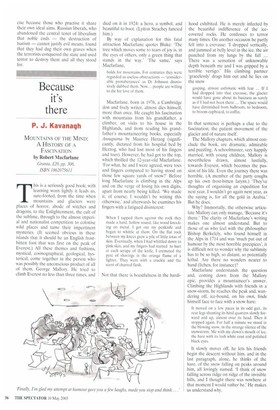Because it's there
P. J. Kavanagh
MOUNTAINS OF THE MIND: A HISTORY OF A FASCINATION by Robert Macfarlane Granta, £20, pp, 306, ISBN 1862075611 This is a seriously good book; with learning worn lightly it leads us, sure-footed, from the time when mountains and glaciers were places of horror, abode of witches and dragons, to the Enlightenment, the cult of the sublime, through to the almost imperial and nationalist competition to colonise wild places and tame their impertinent mysteries. (It seemed obvious in these islands that it should be an English frostbitten foot that was first on the peak of Everest.) All these themes and fashions, mystical, cosmographical, geological, hysterical, come together in the person who was possibly the unconscious product of all of them, George Mallory. He tried to climb Everest no less than three times, and
died on it in 1924: a hero, a symbol, and beautiful to boot. (Lytton Strachey fancied him.) By way of explanation for this fatal attraction Macfarlane quotes Blake: The tree which moves some to tears of joy is, in the eyes of others, only a green thing that stands in the way.' The same,' says Macfarlane,
holds for mountains. For centuries they were regarded as useless obstructions — 'considerable protuberances' as Dr Johnson dismissively dubbed them. Now... people are willing to die for love of them.
Macfarlane, born in 1976, a Cambridge don and lively writer, almost dies himself, more than once. He caught his fascination with mountains from his grandfather, a climber, on visits to his house in the Highlands, and from reading his grandfather's mountaineering books, especially Annapurna by Maurice Herzog (significantly, dictated from his hospital bed by Herzog. who had lost most of his fingers and toes). However, he had got to the top, which thrilled the 12-year-old Macfarlane. 'For what, he and I were agreed, were toes and fingers compared to having stood on those few square yards of snow?' Before long Macfarlane is climbing in the Alps and on the verge of losing his own digits, apart from nearly being killed. 'We made it, of course; I wouldn't be writing this otherwise,' and afterwards he examines his fingers with a fatigued disinterest: When I tapped them against the rock they made a hard, hollow sound. like wood knocking on metal. I got out my penknife and began to whittle at them. On the flat rock between my knees grew a pile of little iotas of skin. Eventually, when I had whittled down to pink skin, and my fingers had started to hurt at each scrape of the knife, I cremated the pyre of shavings in the orange flame of a lighter. They went with a crackle and the scent of charred flesh.
hood exhibited. He is merely infected by the beautiful indifference of the icecovered rocks. He confesses to terror many times. On another occasion he partly fell into a crevasse: 'I dropped vertically, and jammed at belly level in the ice, the air punched from my lungs by the fall ... There was a sensation of unknowable depth beneath me and I was gripped by a terrible vertigo.' His climbing partner 'gracelessly' drags him out and he lies on the snow
gasping, almost asthmatic with fear ... If I had dropped into that crevasse, the glacier would have gone about its business as surely as if I had not been there ... The space would have diminished from ballroom, to bedroom, to broom cupboard, to coffin.
In that sentence is perhaps a clue to the fascination; the patient movement of the glacier and of nature itself.
The Mallory chapters, which almost conclude the book, are dramatic, admirable and puzzling. A schoolmaster, very happily married, with young children, Mallory is nevertheless drawn, almost lustfully, towards Everest, which becomes the passion of his life. Even the journey there was horrible. (A member of the party coughs up his own frost-bitten larynx.) 'They've thoughts of organising an expedition for next year. I wouldn't go again next year, as the saying is, for all the gold in Arabia.' But he does.
Why? Immortally, the otherwise articulate Mallory can only manage, 'Because it's there.' The clarity of Macfarlane's writing makes one almost understand. But to those of us who feel with the philosopher Bishop Berkelely, who found himself in the Alps in 1714 and was 'much put out of humour by the most horrible precipices', it is difficult not to wonder why the sublimity has to be so high, so distant, so potentially lethal. Are there no wonders nearer to hand (lichen, for instance)?
Macfarlane understands the question and, coming down from the Mallory epic, provides a mountaineer's answer. Climbing the Highlands with friends in a snow-storm, he reaches the peak and, wandering off. ice-bound, on his own, finds himself face to face with a snow hare:
It moved on a few paces in its odd gait, its rear legs shunting its hind quarters slowly forward and up, almost over its head. Then it stopped again. For half a minute we stood in the blowing snow, in the strange silence of the snowstorm. Me with my clown's mouth of ice, the hare with its lush white coat and polished black eyes.
It slowly moves off, he lets his friends begin the descent without him, and in the last paragraph, alone, he thinks of the hare, of the snow falling on peaks around him, all lovingly named. 'I think of snow falling across ridge on ridge of the invisible hills, and I thought there was nowhere at that moment I would rather be,' He makes us understand why.


































































 Previous page
Previous page